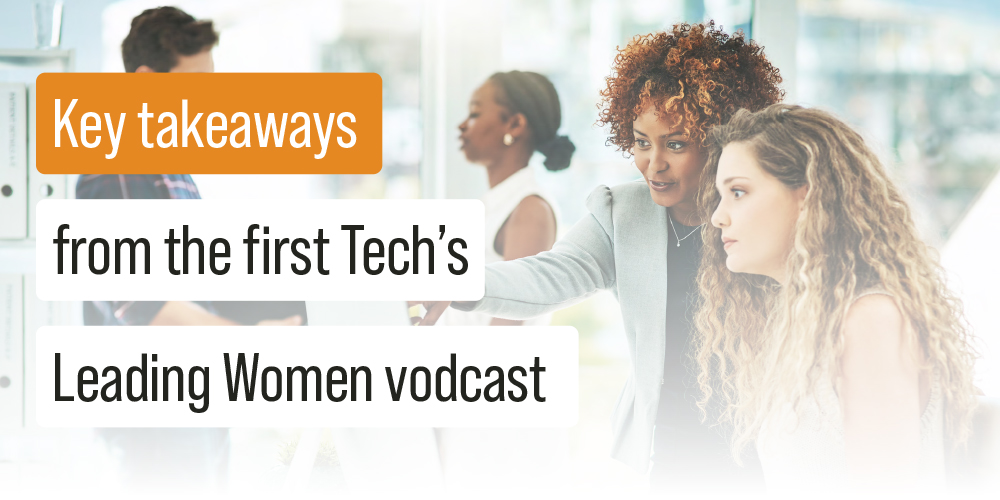The Tech’s Leading Women vodcast launched today. For the next six weeks, a thirty-minute video episode will be released each Monday, aimed at arming women with the support they need to excel in their digital career.
The vodcasts will feature a range of leading voices from the tech industry, who will offer their views and experiences of issues and trends that affect women in the workplace today, as well as actionable advice to help both employers and employees overcome these hurdles. The first episode centres around the new hybrid workplace and what it means for women, and was hosted by Zoë Morris, President at Frank Recruitment Group. She was joined by Leisa Docherty, Chief People Officer at Causeway Technologies, and Fiona Harvey, Head of Marketing Communications and Microsoft Operations at Tisski.
We break down three key takeaways from episode one:
We’ve been presented with an incredible opportunity
This week’s panellists started off by discussing the initial shock that homeworking caused. “Some people really adapted well to homeworking, enjoyed it and continue to, and other people really missed the interaction with others,” began Leisa. “I think from a positive perspective, I’ve always been very supportive of flexible working and I think it forced employers to trust people, and showed that a business can operate effectively without everybody in the office. Not to say that it doesn’t bring some challenges, because it absolutely does, but it can happen, it can be done. And I think there were some extremely positive impacts, because of that.”
While the enforced remote work experiment has presented a chance for real and meaningful change in the workplace, there was an acceptance that it still very much depends on employers adapting to this seismic change. “Speaking personally, as a woman, a parent juggling lots of things, my personal experience has been very positive. I recently joined Causeway and my new boss Phil, he’s CEO, he didn’t even ask me how many days I’d be here or there, or how many days I’d be working from home. Frankly, he doesn’t really mind about that as long as I get the job done, so I think there are a lot of positives depending on your employer.”
One huge benefit of a hybrid working environment that Leisa also mentioned was the improvement to her homelife. “I know a lot of my team have said that they find it really useful that they can pop out and do the school run, stuff like that,” she said. “I think, on a number of levels, not just the practical level, but actually I feel like a better mum when I can do that. I think for people who can manage their life, and enjoy working in a hybrid way, you kind of get the best of both worlds.”
The culture needs to be directed from the top
One major fear for the remote workforce has been the stigma that can be attached to those who aren’t physically present. Fiona talked about her own career path, and how difficult that would have been in today’s virtual environment. She said: “I think that, if I was in an early stage with my career and I was having to work more remotely and not have those interactions, for progression and things, I think I would find that more challenging actually. I think something that we need to look at as we move forward is how people have the opportunity to network, to get to know the right people and get involved in the right things, because they are remote and they’re not in office setting. It’s something that’s really important. I think back to when I started in my career, I don’t think I’d have learned half of what I did if I hadn’t been sitting with a group of people sort of almost learning by osmosis.”
She also added some vital information on making sure that the remote workforce is supported when it comes to career progression. “I think it’s about giving people visibility and sort of giving them the platform for promotion remotely. It’s about the relationship with the employee and the line manager, as well as having those discussions frequently about career path and progression and aspirations and all that sort of stuff and acting on that. And actually, just because you’re in an office or you’re not in an office that’s irrelevant, that sort of stuff should be happening anyway. So I think it boils down to leadership and having that culture, which is about supporting progression and supporting people with their aspirations. And I think that can be done just as well in a remote sense to one that’s office-based.”
Lisa agreed that the overall responsibility for the success of a hybrid environment comes from the top. She added: “I think the steer that the CEO gives is incredibly important and massively impacts how people in the organization feel, and how women feel about how they can develop their career while perhaps raising a family or having other commitments.”
Employers must get on board with it
Finally, there was also a warning for those organizations who try to revert back to an in-person culture as the world allows us to resume again. Lisa said: “In terms of levelling the playing field, if organizations don’t create that, they’re just going to lose their top talent and they’re going to lose people to businesses that are prepared to create that level playing field. Organizations have to accept this as the future. If they don’t give people equal opportunity, however they are working, then they’re going to lose people, because now can now walk easily into another job. And it doesn’t really matter where that business is headquartered, or whether it’s remote or where it is, because of how we all operate.”
Fiona also added a warning that remote work could also have a significant impact on the quit rate amongst organizations who are unwilling to adapt. “I think for staff retention, it’s very easy to resign from a role when you haven’t actually met the person and don’t have that loyalty or connection with somebody,” she said. “It’s dead easy for somebody else to come along and say, ‘Come and work for us. We can offer X, Y, and Z.’ The temptation might be easier for somebody if they don’t have those personal relationships and they don’t feel vested in the relationships with people. So I think that’s something organizations will have to watch actually, is not having that personal bond and rapport that you would have with your manager or with the leadership team.”
There was an array of other advice and insight throughout the episode on a range of other subjects, too. From the blurring of lines between our professional and personal lives post-pandemic, to the importance of communication as organizations keep hybrid and remote working practices in place, the 30-minute episode is the perfect lunchtime accompaniment that will leave you with actionable takeaways that you can implement in your own organization. You can watch the full episode here.






